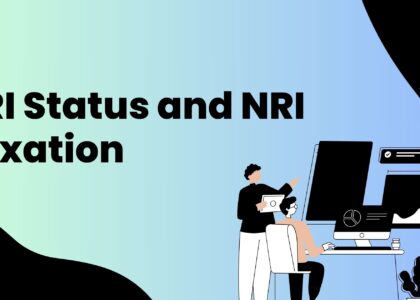As global mobility increases, many Non-Resident Indians (NRIs) are returning home after years of residing abroad. However, this comes with a unique set of tax and regulatory obligations. Early and informed planning can help NRIs minimize tax incidence, stay compliant with Foreign Exchange Management Act (‘FEMA’), and transition financial assets smoothly. Here’s a comprehensive guide to ensure a financially sound return to India.
1. Determining Your Residential Status:
- Under the Income Tax Act: Resident: Stay ≥182 days in a year, or ≥60 days + ≥365 days over the preceding 4 years.
- Exceptions: Indian citizens/PIOs returning from employment can apply alternative day-count rules (e.g. 120 days if income >Rs.15 lakh)
- Categories: ROR (Resident & Ordinarily Resident), RNOR (Resident but Not Ordinarily Resident), NRI (Non-Resident)
- Under FEMA:
- Based on intention to stay rather than days alone: If you return with intent to settle, you’re resident from day one; conversely, working abroad makes you NRI even with >182 days in India.
2. Tax Planning During RNOR :
- Foreign investments (stocks, mutual funds, real estate) can be sold while being RNOR, avoiding Indian tax—if proceeds remain abroad.
- Withdrawals from overseas retirement accounts (e.g., 401(k), pensions) can be timed for the RNOR window or aligned with DTAA benefits.
3. Double Taxation Avoidance Agreement (DTAA):
- After becoming ROR, global income becomes taxable in India. However, relief is available under India’s DTAA network
- Even after becoming ROR, you can claim foreign tax credits via Form 67 under DTAA, reducing double taxation on income taxed abroad
4. FEMA Compliance & Bank Accounts: Upon returning, NRI bank accounts must be restructured:
- NRE/FCNR → Resident Foreign Currency (RFC)
- NRO → Resident rupee account
RFC accounts let you hold foreign currency and earn tax-free interest during RNOR
5. FOREIGN GIFTS AND INHERITANCE:
- Gifts or inheritance received from relatives abroad are usually tax-exempt, but proper documentation (e.g., gift deeds) and FEMA disclosure are required. However, the relatives (donor) should fulfil the definition of ‘relative’ under section 56(2) of the Income Tax Act
- Quick Planning Checklist
- Verify days of stay to determine RNOR eligibility
- Use the RNOR period to defer or minimize tax—sell foreign assets, delay remittances, and wait to withdraw retirement funds.
- Convert bank accounts upon return (NRE/FCNR → RFC; NRO → resident).
- After becoming ROR, disclose global assets in Schedule FA of ITR and claim foreign tax credits via DTAA.
- Keep documentation for cross-border remittances, FDs, inheritances, etc.
Summary of Tax and FEMA aspects
| Aspect | Details |
| 1. Residential Status – Income Tax Act | – Resident if: • Stay ≥182 days in India, OR • Stay ≥60 days + ≥365 days over past 4 years Relaxation for NRIs/PIOs: 120 days if Indian income ≤ ₹15 lakh |
| Residential Categories (Income Tax Act) | – ROR: Resident and Ordinarily Resident – RNOR: Resident but Not Ordinarily Resident – NRI: Non-Resident |
| Residential Status – FEMA | – Based on intention, not days – Returning to settle → Resident from day one – Working abroad → NRI, even if in India >182 days |
| 2. RNOR Tax Planning | – RNOR window (1–3 years) can shield global income – Tax-free sale of foreign assets if proceeds retained abroad – Ideal time for withdrawals from 401(k), pensions, etc. |
| 3. DTAA Benefits | – After becoming ROR, foreign income is taxable – Claim tax credit via Form 67 under applicable DTAA – Avoid double taxation |
| 4. Bank Account Changes (FEMA) | |
| Existing Account Type | Action Required |
| NRE / FCNR | Convert to RFC (Resident Foreign Currency) |
| NRO | Convert to Resident Rupee Account |
| Why RFC Account? | – Hold foreign currency in India – Interest is tax-free during RNOR – Easy repatriation |
| 5. Foreign Gifts & Inheritance | – Gifts/inheritance from relatives abroad generally tax-exempt – Must maintain documentation (gift deed, source, etc.) – Donor should satisfy definition of ‘relative’ as per section 56(2) of the Income Tax Act, 1961 |
| Quick Checklist | 1. Verify RNOR eligibility 2. Use RNOR period to: • Sell foreign assets • Delay remittances • Time withdrawals from retirement accounts 3. Convert NRE/FCNR → RFC; NRO → Resident A/c 4. After becoming ROR: • Disclose global assets (Schedule FA) • Claim foreign tax credit via Form 67 5. Maintain documentation for gifts, deposits, remittances |
Tax planning and impact during RNOR period
| Asset | Action Plan | Tax Impact (During RNOR) |
| 401(k) | Withdrawals during RNOR period | Withdrawals not taxable in India if done during RNOR. |
| US Stocks | Consider selling before becoming ROR | Capital gains not taxable in India if proceeds are not received in India during RNOR. |
| Rental Income (US) | Retain income in US bank account; avoid remittance to India | Not taxable in India if not received or remitted during RNOR. |
| US Bank Savings | Transfer to RFC account after return | No Indian tax on holdings or interest earned while RNOR. |
| RSUs / ESOPs | Exercise or sell during RNOR period | Gains not taxable in India if not remitted to India while RNOR. |
________________________________________________________________________
- Final Thoughts:
Returning to India can be both exciting and financially complex. A clear understanding of your tax residency, proper utilization of the RNOR period, and timely compliance with FEMA rules can make this transition smoother. Consulting a qualified tax and FEMA advisor early in your return journey is highly recommended to optimize benefits and ensure compliance.





